
Birmingham: Finding America’s Sweet Home in Alabama
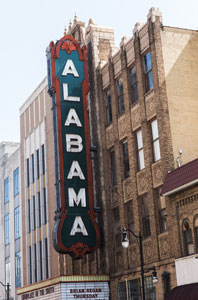 If you live outside the American southeast, you probably don’t come across many people from Birmingham. It’s the largest city in Alabama, but with a population of just over a million people, it doesn’t rank among the nation’s major metropolises. You can probably sing along with Lynyrd Skynyrd when “Sweet Home Alabama” comes on the radio. This is the place where the “skies are so blue,” and, even if you haven’t visited, you’ve probably proclaimed to the Heart of Dixie, “Lord, I’m coming home to you.”
If you live outside the American southeast, you probably don’t come across many people from Birmingham. It’s the largest city in Alabama, but with a population of just over a million people, it doesn’t rank among the nation’s major metropolises. You can probably sing along with Lynyrd Skynyrd when “Sweet Home Alabama” comes on the radio. This is the place where the “skies are so blue,” and, even if you haven’t visited, you’ve probably proclaimed to the Heart of Dixie, “Lord, I’m coming home to you.”
Yet lyrical stylings like, “In Birmingham they love the governor …” also point to a darker southern experience that has left an impression on most Americans. Didn’t the police in Birmingham turn fire hoses and police dogs on children? Yes. Isn’t that the place once known as “Bombingham” because of white supremacist attacks on African-American homes? Yes.
It is the city’s acknowledgement of and emergence from the dark past of segregation that has allowed it to grow into a new kind of “Magic City” and makes it iconically American. Taking in its historic monuments, modern parks, fine dining, and, of course, its tasty barbecue makes Birmingham well worth a trip.
Birmingham is not a city of the pre-Civil War south, where one imagines southern belles descending grand staircases in their hoop skirts. The city has a distinctly blue collar past. It gained the moniker “Magic City” soon after its founding in 1871, because it rapidly emerged as a profitable center for iron and steel production. This is why one can observe the Vulcan, the Roman god of fire and forge, standing atop the mountain overlooking downtown. The park surrounding the statue allows one to take in a picturesque scene of the city in a single glance, and the nearby museum introduces visitors to Birmingham’s history.
One can get a more hands-on look at Birmingham’s industrial history with a visit to the Sloss Furnace on the east end of downtown (20 32nd St. N.). The blast furnace was created more than 90 years ago for the production of iron and steel. Its founder, Col. James Withers Sloss, also helped establish Birmingham, making a visit to the furnace an introduction to the heart of the city’s history. It is one of only two industrial blast furnaces in the US being preserved as a National Historic Landmark and interpreted as a museum.
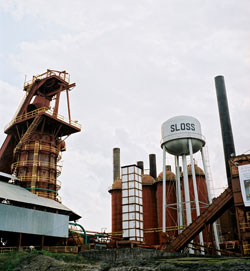
Upon entering the grounds at Sloss, visitors can wander along the paths surrounding its facilities, venture inside buildings and up staircases, and even descend into the tunnels that run below it. This is not a neatly contained historical experience, but one where visitors can come into close, tangible contact with the past. Admission is also free.
If Sloss is a pillar of the city’s industrial history, just a few blocks away one can find new businesses that speak to the entrepreneurial revitalization of Birmingham’s downtown – many of which are friendly to the gluten-free diner. Birmingham’s Second Avenue North has become a center of business growth and urban redevelopment. Walking down the street one can wander through local boutiques and other shops, as well as some of the city’s most popular eateries and bars.
Among the favorites to refuel is Urban Standard, which offers carefully-crafted espresso drinks and popular menus for breakfast, lunch, and dinner. Urban Standard has several gluten-free options with a knowledgeable staff that is always happy to help one navigate the menu. Their gluten-free staples include the chicken salad on greens, which is tasty and satisfying. They also offer several other gluten-free salads, regularly make gluten-free soup, and can substitute cabbage for noodles in their Urban Noodle Bowl.
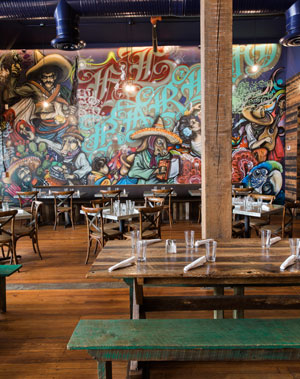 A block further down Second Avenue North, El Barrio Restaurante Y Bar provides a vibrant, communal dining experience with a Latin-American inspired menu where most items can be prepared gluten-free. Their roasted chicken is particularly good, as are their tacos, which come in vegetarian, chicken, pork, and steak variations. If dairy is not an issue for you, be sure to sample the Queso Fundido, which combines tequila, goat cheese, and chipotle seasonings for a delicious and addictive result.
A block further down Second Avenue North, El Barrio Restaurante Y Bar provides a vibrant, communal dining experience with a Latin-American inspired menu where most items can be prepared gluten-free. Their roasted chicken is particularly good, as are their tacos, which come in vegetarian, chicken, pork, and steak variations. If dairy is not an issue for you, be sure to sample the Queso Fundido, which combines tequila, goat cheese, and chipotle seasonings for a delicious and addictive result.
Downtown is also home to some of the city’s more significant historic and cultural points of interest. The McWane Science Center, at the corner of Second Avenue North and 19th Street North, provides children and families with the opportunity to get hands-on science and engineering lessons. Visitors can also take in the well-curated collection of classic and modern work on exhibit at Birmingham Museum of Art (2000 Rev. Abraham Woods Jr. Boulevard), where admission is free.
The northwestern portion of downtown was historically a black neighborhood during segregation, which today is the site of the Birmingham Civil Rights Institute (520 16th Street North). The Institute captures the nuances of the city’s development into a center of the civil rights movement, depicting conditions in segregated schools and buses as well as the churches, homes, and businesses that were staples of black economic and cultural life in Birmingham.
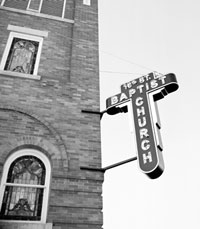 The Institute stands next to Kelly Ingram Park, which includes sculptures and other informational displays explaining the area’s history. Across the street stands 16th Street Baptist Church, which was the nexus of the Children’s Crusade, where thousands of Birmingham children took the streets in May 1963 in peaceful protest to face the city’s police and ultimately arrest. The Ku Klux Klan later bombed a section of the church, killing four young girls and making the building a symbolic focal point of civil rights activism.
The Institute stands next to Kelly Ingram Park, which includes sculptures and other informational displays explaining the area’s history. Across the street stands 16th Street Baptist Church, which was the nexus of the Children’s Crusade, where thousands of Birmingham children took the streets in May 1963 in peaceful protest to face the city’s police and ultimately arrest. The Ku Klux Klan later bombed a section of the church, killing four young girls and making the building a symbolic focal point of civil rights activism.
The spaces devoted to the memory of Birmingham’s civil rights history have looked to communicate a painful past in a way that brings healing and new understanding to residents and visitors alike. One can see evidence of Birmingham’s rehabilitation a few blocks away from the Civil Rights Institute at Railroad Park, where an expansive eight-block green space includes running and walking trails, outdoor gym equipment, a plaza, and even free wifi. It is home to a farmers’ market, concerts and festivals, and free weeknight exercise classes in the spring and summer.
On its southwest corner, Railroad Park borders Birmingham’s recently added Region’s Field, home to the minor league baseball team, the Birmingham Barons. The downtown stadium has made the Barons a popular fixture of Birmingham life, where for just $10 you can spend a pleasant summer night in the bleachers enjoying a basket of nachos.
Birmingham is a city of neighborhoods, and each holds a number of worthwhile stops. One can find another hub of food options south of downtown in Five Points, which is home to Asian fare at Surin of Thailand. Next door is Jim ’N Nicks, one of the city’s popular local barbecue haunts, where their sauces and meat varieties are gluten-free.
Five Points is also the center of fine dining in Birmingham. The city is home to Chef Frank Stitt, a James Beard Foundation Award winner, who merges French culinary training with Alabama produce, meats, and cheeses in farm-to-table style. The highly trained staff at his Highlands Bar and Grill can help gluten-free diners select a delicious meal in line with their dietary needs.
Further southeast in Mountain Brook Village, one can find fine dining more explicitly geared toward gluten-free restaurant goers. At Ollie Irene (2713 Culver Road), Chef Chris Newsome and his wife Anna Lakovitch clearly label gluten-free items like seafood stew and flat-top chicken on their menu. Named after Newsome’s grandmother, the restaurant creates meals that reflect the bounty of each new season in Alabama. They were a James Beard semifinalist for Best New Restaurant in 2012.
If one has the time, Mountain Brook Village is worth further exploration. Taking a pleasant stroll along Cahaba Road, one can venture into a range of local shops, bars, and restaurants. Nearby one can also find Jameson Trail, a scenic walking path that abuts a neighboring stream.
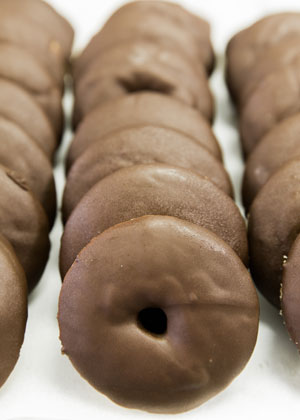 Birmingham recently added a destination specifically geared to the gluten-free traveler in search of a treat. Last July, Carol Key opened the Funky Muffin Bakery, a 100% gluten-free facility that will satiate just about any craving you have when it comes to gluten-free baked goods. Their menu includes made-from scratch gluten-free bread, cookies, cakes, crackers, muffins, pies, brownies, and the like. Their donuts are especially popular among area residents. Key, who was diagnosed with celiac disease in 2003, says the bakery gets significant traffic from visitors to Birmingham who make sure to stop by during their stay in the city. If you have a hankering for something you don’t see in the bakery case, they’re also happy to fill custom orders. The bakery is a 15 minute drive south of the city center, and is well worth a side trip for any gluten-free traveler.
Birmingham recently added a destination specifically geared to the gluten-free traveler in search of a treat. Last July, Carol Key opened the Funky Muffin Bakery, a 100% gluten-free facility that will satiate just about any craving you have when it comes to gluten-free baked goods. Their menu includes made-from scratch gluten-free bread, cookies, cakes, crackers, muffins, pies, brownies, and the like. Their donuts are especially popular among area residents. Key, who was diagnosed with celiac disease in 2003, says the bakery gets significant traffic from visitors to Birmingham who make sure to stop by during their stay in the city. If you have a hankering for something you don’t see in the bakery case, they’re also happy to fill custom orders. The bakery is a 15 minute drive south of the city center, and is well worth a side trip for any gluten-free traveler.
With a gluten-free treat in hand, exploring Birmingham offers any number of possible experiences. Whether it’s an encounter with the city’s nuanced past in science, industry, and civil rights, or sampling from a contemporary culinary scene that draws from local harvests, Birmingham offers its own special piece of America to anyone who takes the time to stop by and visit.
ABOUT THE AUTHORS: Stephen and Annie DeVries first met in Cairo four years ago when he was on a photography assignment and she was working on her PhD research. Now based out of Birmingham, Alabama, Stephen is a food, travel, and lifestyle photographer. Annalise is a writer and teaches history at the University of Alabama. Visit www.stephendevriesphoto.com and www.annalisedevries.com.



